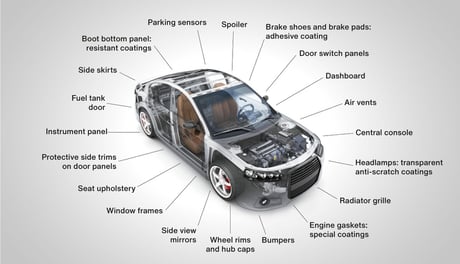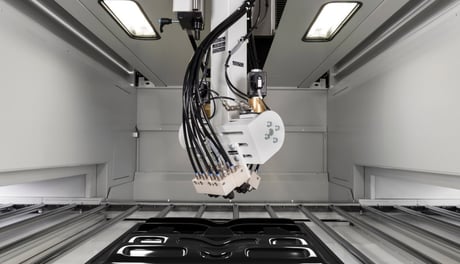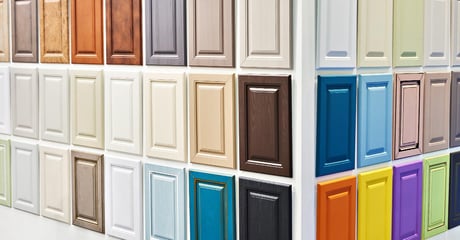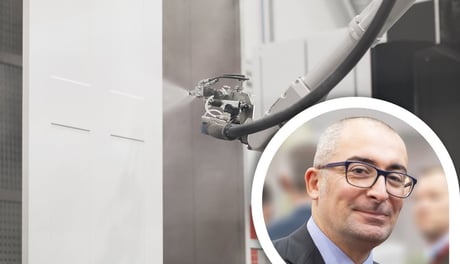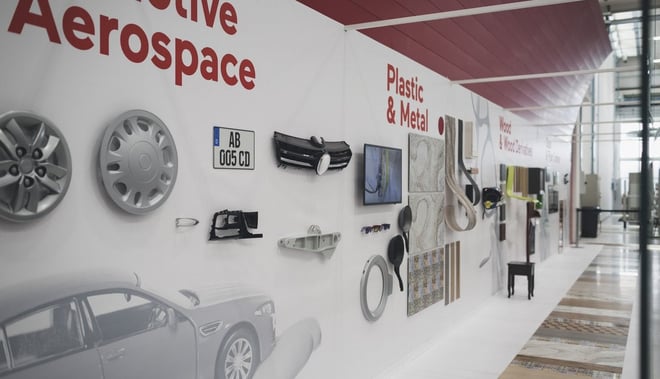
Companies in the automotive sector are focusing on the concept of sustainable mobility and the development of lightweight vehicles. This is why coating and decorating the plastic components that make up the interior are increasingly important. Needless to say, automotive components need to be coated to the very highest standards. In this context, flatbed coating lines have a crucial role to play for companies in the industry.
What are flatbed coating lines?
Car interior components are usually spray-coated on overhead lines or floor-mounted lines with chain conveyors to which skids are attached. These lines use anthropomorphic robots, programmed point to point, inside horizontal airflow spray booths.
On flatbed lines, instead, coating takes place on the surface on which the support skids are laid without securing them; a system equipped with a conveyor belt and a downward vertical air flow is employed. This drastically improves quality. The line also uses a proprietary Cefla system that reads the shape and position of the parts and processes them without any need for programming.
The benefits of flatbed coating
While spray coating lines are more suitable for larger components such as bumpers, smaller components are best managed on flatbed lines as they ensure more consistent quality and higher production efficiency (+20 %).
In addition to higher productivity, flatbed lines ensure higher quality because the overspray that could generate defects is withdrawn from below.
The Cefla Finishing solution with flatbed line demonstrates the advantages of the technique: it boosts productivity by up to 20% and delivers a superb piano black gloss finish on plastic components.
THE MOST INNOVATIVE FINISHING SOLUTIONS
Discover new finishing solutions: more effective, more productive and more competitive than those currently used by the industry.
Integrated lines for a fully automated coating process
Entrepreneurs and plant managers are increasingly interested in integrated lines. These complete solutions include environmentally-neutral equipment for automatic cleaning with dry ice, flatbed Cartesian spraying robots (that can spray pieces of different shape and thickness simultaneously), and vertical or UV ovens for in-line drying to maximise flexibility.
At Cefla Finishing we specialise in the design of complete, turnkey finishing solutions. A Cefla flatbed coating line for automotive components includes the following processes:
- Surface preparation: automatic carbon dioxide snow cleaning and deionization with the Mito oscillating spray coater.
- First coating application: the components pass through a 2D or 3D digital reading barrier in the iBotic cartesian spraying robot where colour, usually black, is applied.
- First drying: the coated components move into the Omnidry vertical oven for 20-30 minutes.
- Second coating application: a new layer of transparent coating is applied, possibly dual-polymerisation using UV rays, again with the iBotic cartesian spraying robot.
- Final drying: transfer into the Omnidry oven for 45 minutes at 70°C and into the UV oven (UV-R M2) to increase the surface hardness of the coating.
Greater efficiency thanks to the line software
Some components require more coating layers than others. So how best to manage them automatically and intelligently? The answer lies in line software like cTracker.
cTracker is a line monitoring tool that automatically adjusts coating operations and sets the correct temperatures for subsequent drying. This ensures each component gets the most suitable treatment, without having to slow or interrupt production.
Yet that’s not the only advantage. With cTracker, users can monitor the pieces on the line, record data and analyse productivity. These functions mean manufacturers can perform production changeovers without emptying the line, tracking and managing individual pieces from a single workstation and regulating all the machines on the line.
Summing up
In the automotive sector, flatbed coating combines innovation with sustainability, allowing manufacturers to efficiently produce exceptionally high-quality plastic components for car interiors. Advanced Cefla Finishing technologies can boost production efficiency by up to 20% while overcoming the limits of traditional methods to deliver ultra-high-quality finishes.
In short, adopting integrated flatbed lines is a strategically sound decision for companies looking to lead the market by combining first-rate production performance with impeccable quality.
Want to switch to a flexible, efficient, top-quality coating system? We’re here to provide all the professional guidance you need.
